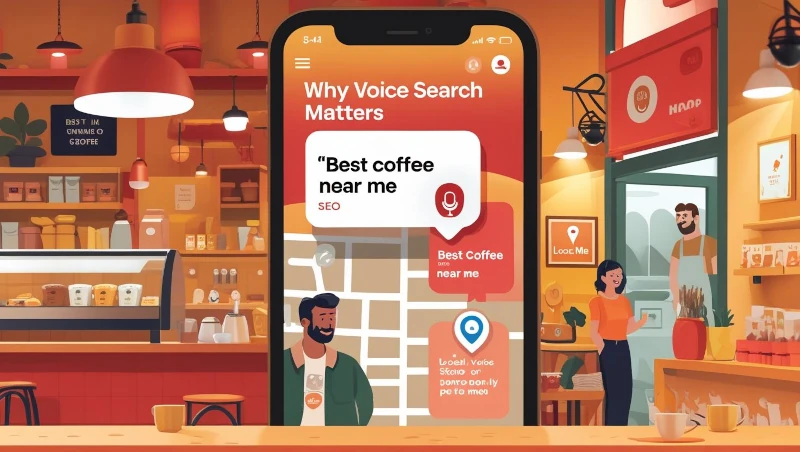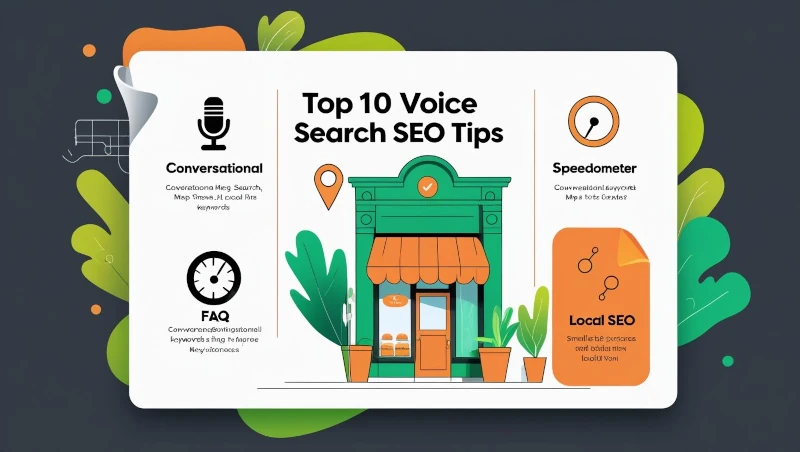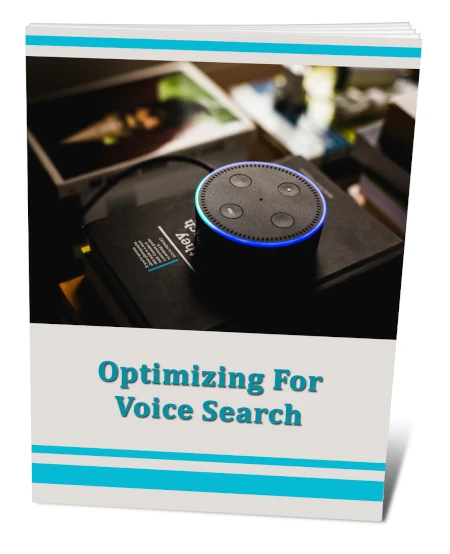Best Voice Search Optimization for Small Business: 10 Powerful Tips
Why Voice Search Is Your Small Biz Superpower
Hey there, small biz rockstar! Imagine a customer saying, “Hey Siri, find the best coffee shop near me,” and your business pops up first. That’s the magic of voice search optimization for small business! With 125.2 million people using voice assistants in 2025 (Statista), voice search is a game-changer for local shops, cafes, and service providers.
Why should you care? Voice search drives local traffic, boosts mobile rankings, and helps you stand out in a crowded market. In this guide, we’re sharing 10 actionable SEO tips to help you rank higher and attract more customers. Ready to make your business the answer to “near me” queries? Let’s dive in!
Table of Contents
Why Voice Search Matters for Small Businesses

The Rise of Voice Search in 2025
Voice search is taking over, and it’s no surprise why! People love the ease of asking their phones or smart speakers for instant answers, whether it’s “Where’s a great pizza place?” or “Find a plumber nearby.” In 2025, over 125.2 million folks are using voice assistants like Siri and Alexa (Statista), making this a must-tap opportunity for small businesses.
According to SEMrush, local search queries are surging, with thousands of monthly searches for terms tied to nearby services. This trend is driven by busy customers who want quick, hands-free solutions while on the go—think parents juggling errands or professionals hunting for a lunch spot. The 81% growth in AI-driven conversational queries (Search Engine Journal) means search engines are getting smarter at understanding natural speech, giving you a chance to connect with locals right when they need you.
For small shops, cafes, or service providers, this is your moment to shine in mobile searches and drive foot traffic. Get in on this now, and you’ll be ahead of the curve, winning customers with every “Hey Google” request!
Voice search isn’t just a trend—it’s a must. With 81% growth in AI-driven conversational queries (Search Engine Journal), optimizing now puts you ahead of the curve.
Why Small Businesses Need Voice Search SEO
Picture this: A homeowner says, “Hey Google, find an emergency plumber near me,” and your plumbing business ranks first. That’s voice search SEO in action! It’s a game-changer for small businesses because it targets local customers right when they’re ready to buy. Unlike traditional SEO, which can feel like a big-brand battle, voice search levels the playing field. It’s all about answering real questions people ask, like “Where’s the best coffee shop?” or “Who fixes AC nearby?”
Here’s why it’s a must: Most voice searches are mobile and local, with 50% of users looking for businesses within minutes of searching (WordStream). For a small biz, that’s a golden opportunity to snag customers before they hit the big chains. Plus, it’s low-effort compared to complex ad campaigns. Take a local bakery, for example—they optimized their site for “fresh cupcakes near me” and saw walk-in traffic double in a month.
Voice search also boosts your mobile rankings, which is huge since 80% of these queries happen on phones. And here’s the kicker: It’s not just about tech—it’s about connecting with your community. When you rank for conversational queries, you’re the friendly face customers trust. Who doesn’t want that, right?
Quick Tip: Check your Google My Business profile to ensure it’s voice-search-ready with updated hours, photos, and services. It’s a simple step that packs a big punch!
Top 10 Voice Search SEO Tips for Small Businesses
No fluff, just the good stuff! These 10 proven tips will help your small business shine in voice search results by 2025. Each tip is packed with examples, tools, and steps to make your site the go-to answer for “near me” queries. Let’s dive in and grow your local traffic!

1. Optimize for Conversational Keywords
Voice search is all about natural speech. Customers don’t type “bakery Seattle”; they say, “Where’s the best bakery near me?” Long-tail, conversational keywords are your ticket to ranking higher. These phrases mirror how people talk to Siri or Alexa, making your site more likely to pop up. For small businesses, this is a game-changer—targeting specific queries like “best cupcakes today” can drive targeted traffic.
A Seattle bakery, for example, optimized for “where can I get cupcakes today?” and saw a 20% traffic spike in a month. Start by brainstorming questions your customers ask daily, like “What’s the best pizza place open now?” Use tools like AnswerThePublic to uncover these gems. Add 5-10 phrases to your homepage, blog posts, or service pages. Don’t overstuff—keep it natural, like you’re chatting with a friend. This simple step can boost your rankings and bring in local foot traffic.
Quick Tip: List 5 conversational keywords today and weave them into one page.
2. Claim and Optimize Your Google My Business Profile
Your Google My Business (GMB) profile is a voice search superstar. It’s often the first result for “near me” queries, so making it shine is non-negotiable. A complete GMB profile with hours, photos, and services tells search engines you’re legit, boosting your local rankings. A local salon in Miami ranked for “haircut near me” after adding weekly posts and responding to reviews, driving 25% more bookings.
Claim your free profile at Google My Business and fill out every detail—categories, descriptions, even Q&A sections. Post updates about promotions or events to stay fresh. Encourage happy customers to leave reviews; they’re gold for credibility. Check your profile weekly to ensure accuracy, especially if hours change. This low-effort task delivers big results, connecting you with customers searching on their phones.
Quick Tip: Add a weekly GMB post to keep your profile active and relevant.
3. Create FAQ Pages for Voice Queries
Voice search thrives on questions like “How much does a plumber cost?” or “What’s vegan at this restaurant?” FAQ pages are your secret weapon to answer these directly, boosting your chances of ranking. A restaurant in Chicago created an FAQ page for “what’s vegan here?” and saw 15% more foot traffic from voice searches.
Use SEMrush to find common questions in your niche, like “Where’s the nearest dog groomer?” Write clear, concise answers in a conversational tone, as if you’re talking to a customer. Add these to a dedicated FAQ page or sprinkle them across service pages. This not only helps with voice search but also builds trust with visitors. Aim for 5-10 FAQs to start, and update them as customer needs evolve. It’s a simple way to show search engines you’re the go-to source.
Quick Tip: Draft 5 FAQs this week to tackle your customers’ top questions.
4. Boost Site Speed for Mobile Users
Most voice searches happen on phones, so a slow website is a dealbreaker. Fast sites rank higher and keep customers from bouncing to competitors. A coffee shop in Denver cut their site’s load time to 2 seconds by compressing images, boosting their “coffee near me” ranking and doubling online orders.
Test your site with Google PageSpeed Insights to spot issues like large images or clunky code. Use a fast hosting provider, enable browser caching, and optimize images with tools like TinyPNG. Mobile-first indexing means Google prioritizes your mobile site, so don’t skip this step. A speedy site also improves user experience, encouraging visitors to stay and shop. Check your speed monthly to stay ahead. This technical tweak is worth the effort for local businesses aiming to dominate voice search results.
Quick Tip: Run a PageSpeed test today and fix one issue to start speeding up.
5. Use Structured Data Markup
Structured data, or schema markup, is like a cheat code for search engines. It helps them understand your site’s content, increasing your chances of appearing in rich snippets or voice results. A pet store in Atlanta added local business schema and ranked for “pet supplies near me,” gaining 30% more clicks. Use Google’s Structured Data Markup Helper to add schema for FAQs, local business, or products.
For example, mark up your address, hours, or customer reviews to stand out. This techy step sounds complex but takes less than an hour with free tools. Test your markup with Google’s Rich Results Test to ensure it’s working. Structured data gives small businesses an edge, especially for local queries. Start with one schema type and expand as you grow.
Quick Tip: Add one schema type to your site this month to boost visibility.
6. Target Featured Snippets
Voice assistants often read featured snippets—those answer boxes at the top of Google—so claiming them is a must. A florist in Boston optimized a blog post for “best flowers for weddings” with a concise 50-word answer and snagged the snippet, driving 40% more inquiries. Use Ahrefs to find “how to” or “what is” questions in your niche.
Write clear, 40-60-word answers in a paragraph or list format, and place them near the top of a blog post. Include the question as a subheading to make it obvious. For example, “What’s the best gym in Miami?” could lead with a quick answer about your classes. This strategy boosts your voice search rankings and positions you as an authority. Update your snippet content regularly to stay competitive.
Quick Tip: Optimize one blog post for a featured snippet this week.
7. Optimize for Local SEO
Voice search loves location-based queries like “Denver plumber” or “Miami yoga classes.” Adding city-specific keywords to your site can skyrocket your rankings. A gym in Miami ranked for “yoga classes in Miami” after updating their homepage with local terms, gaining 50 new members. Use Moz Local to ensure your business listings are consistent across directories like Yelp or Bing.
Add your city to page titles, meta descriptions, and content—think “best Denver coffee shop” instead of just “coffee shop.” Create location-specific pages if you serve multiple areas. Encourage customers to mention your city in reviews, as this reinforces relevance. Local SEO is a powerhouse for small businesses, especially for “near me” searches, which make up 50% of voice queries. Check your local rankings monthly to track progress.
Quick Tip: Add your city to 3 pages on your site this week.
8. Create Voice-Friendly Content
Write like you’re chatting with a friend—voice search favors natural, spoken language. Stiff, formal text won’t cut it when customers ask, “What’s a good read?” A bookstore in Portland answered this in a blog post with a conversational tone, ranking higher and selling 20% more books. Use Grammarly to ensure your content sounds friendly and approachable.
Rewrite key pages, like your “About” or service pages, to mimic how you’d explain your business in person. For example, instead of “We provide plumbing services,” try “Need a plumber fast? We fix leaks in no time!” Include question-based headings like “Why Choose Our Cafe?” to match voice queries. This approach not only helps rankings but also connects with customers emotionally. Update one page at a time to keep it manageable.
Quick Tip: Rewrite one page in a spoken style this week.
9. Monitor Voice Search Analytics
Tracking your site’s performance shows you which voice queries drive traffic, like “near me” or “open now.” A retailer in Seattle spotted “near me” trends in their analytics and optimized for them, doubling local traffic in two months. Use Google Search Console to monitor search queries—filter for questions or local terms like “best tacos nearby.” Look at click-through rates to see what’s resonating.
If you notice “where’s a good dentist?” trending, create content to answer it. This data-driven approach helps you stay ahead of competitors. Set aside 10 minutes weekly to check your analytics and jot down new keyword ideas. Pair this with customer feedback to fine-tune your strategy. Analytics are your roadmap to voice search success, guiding you to more customers.
Quick Tip: Check your analytics for voice queries weekly to spot trends.
10. Test Voice Search Queries
Want to know how your business ranks? Grab your phone or smart speaker and test it! Saying “best brunch near me” or “emergency vet nearby” reveals where you stand. A cafe in San Diego tested “best brunch near me,” tweaked their site for local keywords, and climbed to the top spot, boosting reservations by 35%. Use your smartphone or Alexa to try 5-10 queries relevant to your business, like “best [your service] near me.”
Note which competitors appear and what they’re doing better. Adjust your content based on these insights—maybe add more “open now” phrases or update your hours. Testing is quick, free, and shows you exactly what customers hear. Do this weekly to stay on top of changes in search algorithms.
Quick Tip: Test 5 voice search queries this week and make one tweak.
How to Get Started with Voice Search SEO
Your First Steps
Feeling like voice search is a big leap? You’ve got this! Starting with how to optimize voice search for small business doesn’t have to be overwhelming. Begin with one simple page on your website—maybe your homepage or a service page—and sprinkle in conversational keywords like “best coffee near me” or “emergency plumber open now.” These phrases match how real people talk to their devices, boosting your chances of ranking higher.
Next, claim your free Google My Business profile if you haven’t already. It’s a must for local searches and takes just 10 minutes to set up. Add your hours, photos, and a quick post about your latest offer. Then, use Google Search Console to track which queries bring visitors to your site. Look for question-based phrases like “where’s a good bakery?” to see what’s working.
Don’t know where to begin? Try this: Pick one tip from our top 10 list each week. For example, week one could be adding an FAQ page to answer customer questions. By 2025, you’ll have a site that’s a magnet for local customers. A pet store in Austin, for instance, started with how to optimize voice search for small business by adding “pet supplies near me” to their site and saw 30% more foot traffic in a month.
Start small, track results, and watch your rankings soar!
Mistakes to Avoid
- Ignoring mobile users: 80% of voice searches happen on phones, so test your site’s mobile speed.
- Skipping local keywords: “Near me” queries are your goldmine—don’t miss them!
- Overcomplicating content: Keep it simple, like you’re chatting with a friend.
Quick Tip: Optimize one page for voice search today and check your progress in a week. You’re building a business that shines!
FAQs About Voice Search Optimization for Small Business

What is voice search optimization for small business?
It’s the process of tweaking your website to rank higher when people use voice assistants like Siri or Alexa to find local businesses.
How does voice search affect small businesses?
Voice search drives local traffic, boosts mobile rankings, and helps small businesses compete with bigger brands.
What are the best tools for voice search SEO?
Try Google My Business, SEMrush, AnswerThePublic, and Google PageSpeed Insights for quick wins.
Why is local SEO important for voice search?
Most voice searches are location-based, like “near me” queries, making local SEO key to ranking higher.
How can I track voice search performance?
Use Google Search Console to monitor question-based and local queries driving traffic to your site.

Conclusion: Your Voice Search Journey Starts Now
You’re on the cusp of something big, small biz superstar! Voice search is transforming how customers find local businesses, and with 10 proven small business voice search tips—like conversational keywords, FAQ pages, and a polished Google My Business profile—you’re ready to lead the pack in 2025. Imagine a customer saying, “Hey Google, where’s the best taco truck nearby?” and your business stealing the spotlight. That’s the power of voice search SEO 2025, connecting you with locals ready to buy.
Don’t let the tech intimidate you—starting is easier than you think! Dive into how to optimize voice search for small business by picking one tip, like adding “near me” phrases to your homepage. It’s all about small, steady steps that deliver big wins, like more foot traffic and loyal customers. Local voice search optimization is your key to capturing the 50% of voice users seeking nearby businesses (WordStream).
Use free tools like Google Search Console to track rankings and spot trends, celebrating every new visitor as a step toward growth. Try a tip today, like testing queries on your phone, and watch your business climb the SERPs. Got a win to share? Leave a comment—we’re rooting for you! Your journey starts now, and you’re building a legacy that shines!








